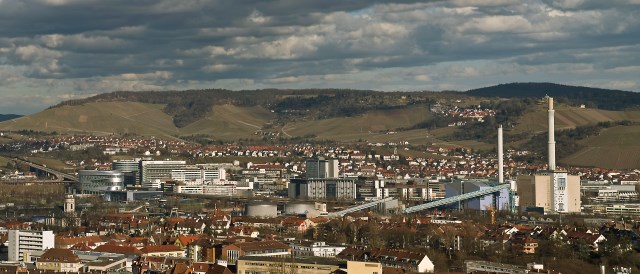Experts say that industry can help the transition to intermittent renewables by shifting power demand. Now, German think tank Agora Energiewende has published the English translation of its report, which our Craig Morris reviews.

Stuttgart, one of southern Germany’s industrial powerhouses and home to countless industrial electricity consumers like Daimler-Benz (Photo by pjt56, CC BY 3.0).
As I recently explained, demand management has just been rolled out as a market in Germany, albeit on a small scale. The potential is obviously much greater.
A new study published by Agora Energiewende (PDF) does not exactly investigate what the potential is for Germany as a whole, but rather for southern Germany. The reason is quite simple: much of the country’s industrial base is located in southern towns like Frankfurt, Darmstadt, Mannheim, Ludwigsburg, Stuttgart, and Munich. Yet, many of the country’s nuclear plants to be shut down are also located in the South. As a result, Germany will be losing much of its generation capacity in the very areas where a lot of power is consumed.
To make things worse, a lot of the country’s wind power capacity is in the North, where wind conditions are better – and, of course, all of Germany’s offshore wind power will also be located in the North.
In a recent study, Agora argues that more distributed power would alleviate the North/South problem and even be cost-neutral partly because the grid would not have to be expanded so much. Now, the think tank is following up the same type of argumentation by pointing out how industry can even make money by shifting demand.
The two southern German states of Baden-Württemberg out and Bavaria make up nearly 30 percent of total power consumption in the country, with Bavaria consuming 79 terawatt-hours in 2010, compared to 71 in Baden-Württemberg in 2009. In both states, industry makes up between 55 and 60 percent of that power consumption. Likewise, while German power consumption peaks at around 80 GW, it peaks at around 25 in these two states alone. Overall, industry in the two states has a maximum power load of around 14 GW.
The study found that more than a gigawatt of that could be temporarily switched off for 30 minutes to two hours, though the firms need prior notification ranging (depending on the type of production) from roughly an hour to 24 hours. But financial incentives are an obstacle; Agora estimates that firms are likely to become interested if they can reduce their power costs “by more than five percent. Lower incentives may be sufficient for larger firms.”
The study also provides some interesting insights into the composition of industry in southern Germany. And if I could add my own two bits, I think it’s time for Germany to start requiring private households to get involved in load management. There’s some low-hanging fruit to be had. A quick back-of-the-envelope calculation: assuming that Germany’s roughly 26 million households each have refrigerators consuming 50 watts on the average, that is more than 1.3 gigawatts of shiftable load, and people would not even notice it.
Craig Morris (@PPchef) is the lead author of German Energy Transition. He directs Petite Planète and is writes every workday for Renewables International.
[…] Load Management In Germany – The Potential […]
Thanks for your blog, I really enjoy reading it. About your own thoughts: How do you think can we harvest the low-hanging fruit in private households without providing them with “smart” fridges and/or meters? After all, that would require a massive and costly hardware update. And without smart technologies I can hardly think of a way people on a large scale would switch off their fridges or other devices manually. Plus during the week many of them are simply not at home to switch anything off – even if they wanted to.
“refrigerators … shiftable load”
I don’t follow? Aren’t fridges switched on 24/7?
Time-shifting household appliances that are ‘occasional-use’, such as washing machines, makes much more sense
No, fridges run less than half the time: http://wiki.answers.com/Q/How_many_hours_does_a_refrigerator_operate_in_a_day
Christopher, I think Germany needs to require that all new fridges be “smart”. Smart meters are already being rolled out. The technology has been there for years. We just need to decide on a standard. And yes, the fridges have to switch on and off automatically; people should not be bothered (or notice a different, except in their lower power bills).